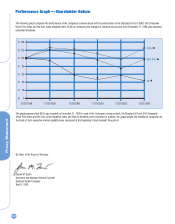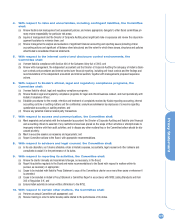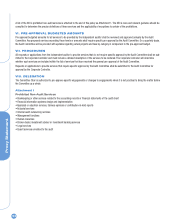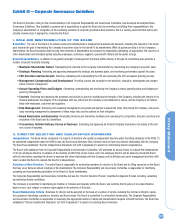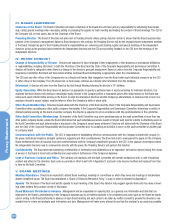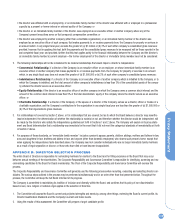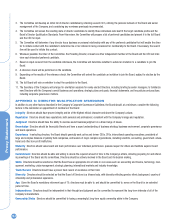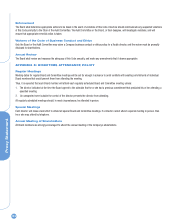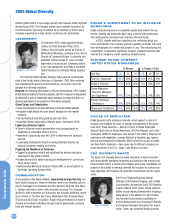Kodak 2003 Annual Report Download - page 132
Download and view the complete annual report
Please find page 132 of the 2003 Kodak annual report below. You can navigate through the pages in the report by either clicking on the pages listed below, or by using the keyword search tool below to find specific information within the annual report.
Proxy Statement
132
Changes
Changes in Board compensation should come at the suggestion of the Corporate Responsibility and Governance Committee, but with full dis-
cussion and concurrence by the Board.
Employee Directors
The Company’s employee directors will not receive additional compensation for their service as directors.
IX. DIRECTOR ORIENTATION AND EDUCATION
Director Orientation
The Company, under the direction of the Corporate Responsibility and Governance Committee and with the assistance of the
Corporate Secretary, conducts orientation for newly elected members of the Board. This orientation familiarizes new directors with, among other things,
the Company’s business, strategic plans, significant financial, accounting and risk management issues, compliance programs, conflicts policies, code of
business conduct, corporate governance and principal officers. It also includes meetings with and presentations by key management and visits to
Company facilities. Each new director will participate in the Company’s director orientation.
Director Education
The Board also recognizes the importance of continuing education for its members. Each director is expected to participate in
continuing education in order to maintain the necessary level of expertise to perform his or her responsibilities as a director. The Board acknowledges
that director continuing education may be provided in a variety of different forms including: external or internal education programs, presentations or
briefings on particular topics, educational materials, meetings with key management and visits to Company facilities. The Company, under the direction
of the Corporate Responsibility and Governance Committee and with the assistance of the Corporate Secretary, will assist the directors in pursuing con-
tinuing education opportunities.
X. MANAGEMENT EVALUATION AND SUCCESSION
CEO Evaluation
The Executive Compensation and Development Committee evaluates the CEO annually, and reviews its actions with the Board. The
Board communicates its views to the CEO through the Chair of the Executive Compensation and Development Committee. The Executive Compensation
and Development Committee’s evaluation of the CEO is based on a combination of objective and subjective criteria and is discussed in the Company’s
annual proxy statement.
Succession Planning
Succession planning for the Company’s CEO and President is the entire Board’s responsibility. To assist the Board, the CEO will
present to the Executive Compensation and Development Committee an annual report on succession planning for all senior officers of the Company with
an assessment of senior officers and their potential to succeed the CEO and other senior management positions. The CEO, together with the Chair of the
Executive Compensation and Development Committee, reviews this report with the entire Board. As a matter of policy, the CEO provides the Board, on a
regular basis, his or her recommendation as to a successor in the event he or she is no longer able to serve as CEO.
Management Development
The Board, acting through its Executive Compensation and Development Committee, will determine that a satisfactory
system is in effect for education, development and orderly succession of senior and mid-level managers throughout the Company. There should be an
annual report by the CEO, first to the Executive Compensation and Development Committee, and then to the Board, on the Company’s program for man-
agement development.
XI. ANNUAL PERFORMANCE EVALUATIONS
Board Evaluation
The Board, under the direction of the Corporate Responsibility and Governance Committee, will annually conduct a self-evaluation
to determine whether it and its committees are functioning effectively. The results of this evaluation will be presented to the Board for its review and dis-
cussion.
Committee Evaluations
Each committee, with the exception of the Executive Committee, will annually conduct a self-evaluation of its performance.
The results of such evaluation will be reported to and reviewed by the Corporate Responsibility and Governance Committee. The Corporate Responsibility
and Governance Committee will report the results of its review of these evaluations to the Board.
APPENDIX A: DIRECTOR INDEPENDENCE STANDARDS
Pursuant to the recently finalized NYSE Listing Standards, the Board of Directors has adopted Director Independence Standards to assist in its determi-
nation of director independence. To be considered “independent” for purposes of these standards, a director must be determined, by resolution of the
Board as a whole, after due deliberation, to have no material relationship with the Company other than as a director. In each case, the Board will broadly
consider all relevant facts and circumstances and will apply the following standards.
1. A director will not be considered “independent” if, within the preceding three years:
• the director was an employee, or an immediate family member of the director was an executive officer of the Company; or
• the director, or an immediate family member of the director, received more than $100,000 per year in direct compensation from the Company,
other than director fees and pension or other forms of deferred compensation for prior service (provided that such compensation is not contingent
in any way of continued service with the Company); except that compensation received by an immediate family member of the director for servic-
es as an non-executive employee of the Company need not be considered in determining independence under this test; or


